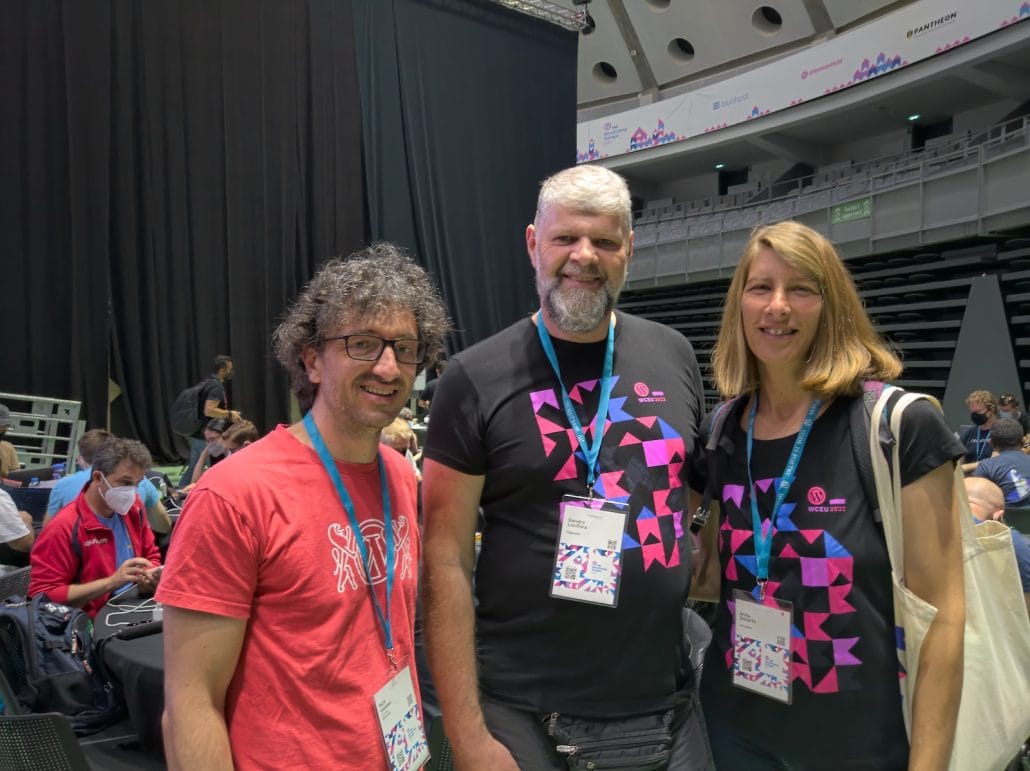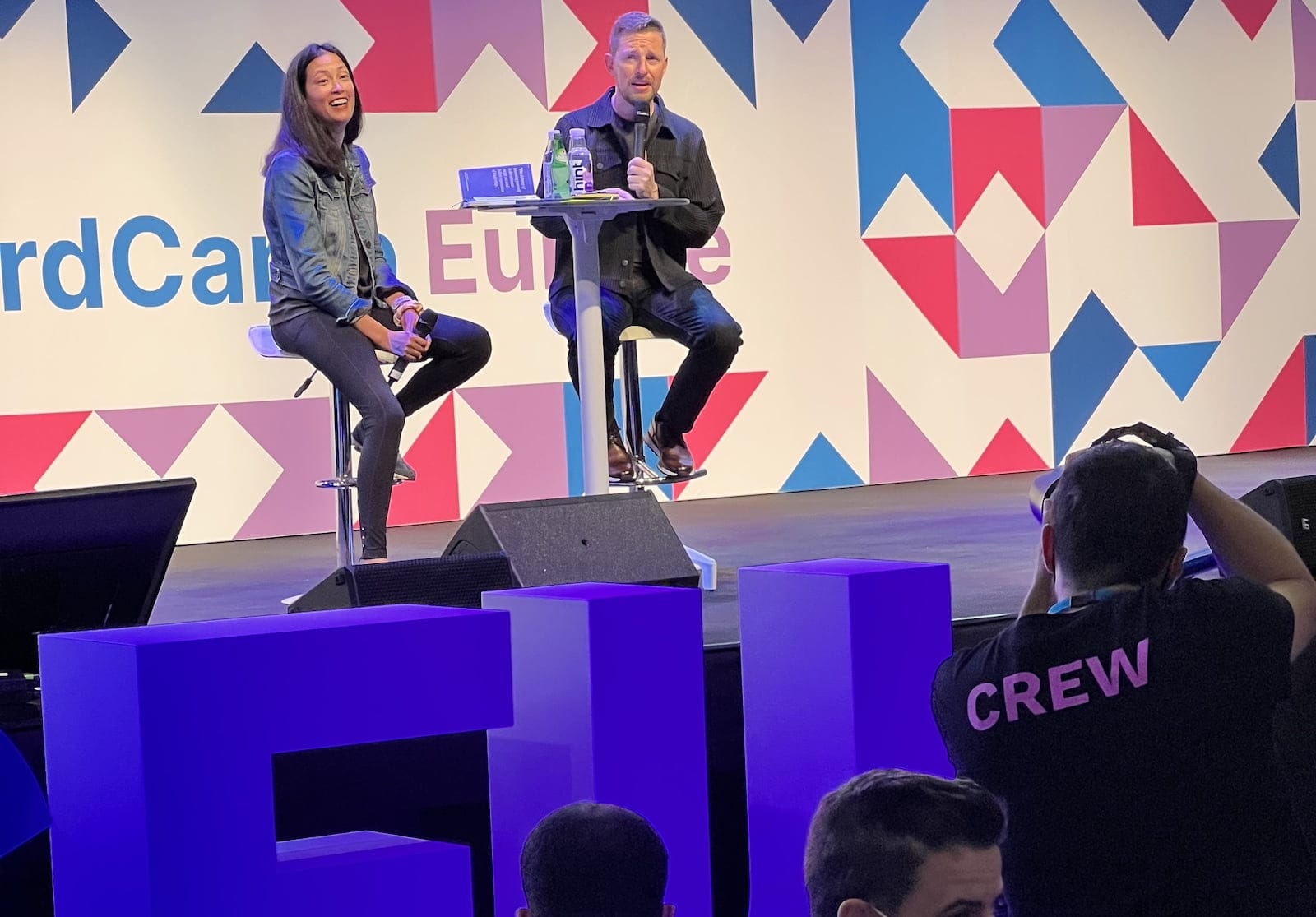It’s been 3 years since I set sail to meet old and new friends at the biggest WordPress community event in Europe – and actually worldwide – with literally thousands of attendees from 91 (!) countries all around the world (~2700 tickets sold). WordCamp Europe finally returned to the beautiful city of Porto/Portugal at the beginning of a sporadically rainy month of June. After being postponed in 2020 and taking place online-only in 2021, everybody was seemingly excited to meet in-person again to chat about their favorite Open Web Platform: WordPress.
The Open Web on a low level is the collection of open, royalty-free technologies which enable the Web. Using the Open Web Platform, everyone has the right to implement a software component of the Web without requiring any approvals or waiving license fees. Hypertext Transfer Protocol (HTTP) is the foundation of data communication for the World Wide Web. It was invented in 1989 by computer scientist Tim Berners-Lee, who is now director of the World Wide Web Consortium (W3C), which oversees the continued development of the Open Web.
The Open Web, as impactful as it is for our society, is currently in danger and has been for a while now, because walled gardens and app stores are monopolizing on information. This article is a recap from my WordCamp Europe 2022 experience with a focus on the topic of the Open Web and why Open Source software like WordPress is so important for democratizing publishing and commerce.
Walled Gardens
Meta (Facebook) and Google are the most popular examples of walled gardens and although Google is also a big propenent of the Open Web, Google’s ad business is jeapardizing user privacy, which is an important part of the Open Web philosophy.
- Both companies have a vast amount of first-party user data, which has become even more valuable now with the impending deprecation of third-party cookies. Google has over 1.5 billion monthly Gmail users and Facebook has 2.8 billion monthly users.
- Many of these users are persistently logged into their Google and Facebook accounts across multiple devices they own, giving the Duopoly access to the deterministic data needed to target users across devices with a high level of attribution accuracy.
- Google, in specific, also builds and distributes browsers (Chrome) and operating systems (Android), which gives the company even more control over the ecosystem.
One day 1 of WordCamp Europe, WordPress Core Contributor and WP-CLI maintainer Alain Schlesser, convinced us that the WordPress community needs to do really better in making the publishing of free content on the Open Web sustainable. At the end of his great presentation, Caspar Hübinger asked him why the Open Web is so precious. Here’s the video with Caspar’s question and Alain’s answer, followed by the transcript.
The Importance of the Open Web
Transcript of the video above.
Moderator: [00:00:00] Time for questions. Just a reminder, we have a microphone in the corridor. So if you have any questions, please go there. And if you feel too shy, he’s available here as well after we talk a little bit, chatting. Caspar!
Caspar Hübinger: [00:00:20] Can you hear me? Okay, thank you for this talk, personally and overall. Well, you really spoke to my heart. And, you know, I’ve been quite open about this topic, and I’m not from a software architecture standpoint, you know how much I admire you as a software engineer and how you can speak to these topics in a very different way than just like a random user (?) WordCamp. That being said, that last thing you said, we’re losing something very precious. Can I ask a question about that?
Alain Schlesser: [00:00:50] Yes, sure.
What’s so Precious about the Open Web
Caspar Hübinger: [00:00:51] So, I have a new boss and he’s three years old. […] In the near future where I have to possibly explain to him what is so precious about that thing. That is not really what he will be experiencing. Once he learns to pick up the phone, he will be confronted with native apps and with the convenience that they bring and was downloading something from an app store. He’s doing that already, actually. And so what’s so precious about that thing to somebody who is that early in their lives and is just starting out with digital and using the digital world and becoming a citizen of the digital world? What is so precious about this Open Web thing and how can I explain that to him?
Alain Schlesser: [00:01:37] That is an awesome question, and I didn’t expect anything less, to be honest. Um, so I think there’s two reasons why the Open Web is so precious. Let me go into the two of them separately.
Availability of Information
Alain Schlesser: [00:01:57] One of them is availability of information without gatekeeping. The Open Web was built as a way of sharing knowledge, sharing academical insights on a global scale. It accelerated our thinking. It accelerated humankind’s progress. It accelerated science and all the other disciplines. Just because … It’s like what I was talking about here, the time to first bite (TTFB), how long it takes to actually respond to a request. Well, before the Internet, if you had a scientific request, it took months to respond to that. And all of a sudden it took seconds. So it accelerated everything. It elevated everything. And the reason why the Web is in danger is because it was so easy to share information about creating something that can endanger the web. So the Web itself (?) helped to accelerate that as well.
Quality of Information
Alain Schlesser: [00:03:15] The other point, the second one, is the nonconformity and diversity of the Open Web in its thinking. So not only is it so that the information is freely accessible, it is also that every opinion can be part of an Open Web. And we’re losing a lot of that right now because of the way native apps work, because of how they technologically work. If you have something like your Twitter feed, it goes through a filter first where there’s already ideas being discarded, whether it is good or bad, that these ideas are discarded that is debatable, but that these ideas are discarded without people even thinking about that fact, without thinking about censorship, that is problematic. And it is also after this filtering, there is this algorithm. It’s called the algorithm. Well, it’s much more than that.
But usually people call it the algorithm that tailors the content to you. And basically you only read about ideas that you already bought into. You’re getting confirmation for your ideas and nothing else. So it hinders you to learn about new ideas and it might confirm the wrong ideas for you. So this the Open Web, it is unfiltered, it is raw, and that is its power. And being able to share something without censorship, it can present a danger as well. But it is not the danger that is self-accelerating. The opposite of it is censorship, filtering echo chambers, that is self-accelerating. It gets worse and then it gets worse quicker. And that doesn’t happen with you. I think these two separate ideas. So the availability of the information and the quality of the information, that is what makes the group so precious and no controlled environment of whatever form, from a corporate entity, from a governmental entity can be a replacement for it because it will always fall into these filtering and gatekeeping steps. Thank you for the question.
Moderator: [00:05:58] Another question.
WordPress Europe Contributor Day
Thursday, the day before the WordPress conference, was dedicated to contributing to the WordPress eco system. With ~800 attendees this was the biggest WordPress contributor day in history. Having been a WordPress polyglot and maintaining the German (Switzerland) de_CH locale for a couple of years, I joined other polyglots from Portugal, France and Germany, discussing pain points and things like locale variants in Glotpress, the translation platform used by translate.wordpress.org and other important things that are relevant for languages that have different variants. Portuguese, Spanish and German are just three examples where there are various minor differences depending on the geography they’re used in. If you’re interested in how we’re handling that for German (Switzerland), have a look at the handbook which is available both in English and German. This is not only important for WordPress Core, but also for plugins and themes.
WordCamp Europe Day 1 & Day 2
On Friday and Saturday, I listened to many other interesting presentations and joined various workshops:
- Protect your Website Visitors with Security Headers
- Lighting Talks about the Gutenberg Block Editor
- Is podcasting the future of WordPress?
- Acquisitions in WordPress
- Deploying WordPress with confidence using CI/CD
- The future of commerce in WordPress with Full Site Editing
- WordPress and Web 3 trends – disruption, challenges, opportunities
- Building a Sustainable Community through Meetups
- Community Townhall Q&A with WordPress co-founder Matt Mullenweg and WordPress.org Executive Director Josepha Haden Chomphosy
I will dedicate another article to Dave Lockie’s presentation about WordPress and Web 3. He’s the new Web 3 Lead at Automattic, who gave us a whistle stop tour of the Web 3 universe – what is Web 3? What are DAOs, NFTs, smart contracts, Layer 2s and DeFi?
I’ll leave you with a picture of this year’s Openstream delegation at WordCamp Europe 2022: Anita, Sandro and myself. As you can tell from the t-shirts, they have been part of the huge team of organizers and volunteers of the event, without which events like that wouldn’t be possible. So thank you Anita and Sandro. You rock!

If you would like to see more pictures, check out more of my tweets from the event and our Instagram story highlights.
WordCamp Europe 2023
At the end of every WordCamp Europe, there’s an anouncement in which country and city the next one will take place. This is gonna be awesome!
Credits/Sources
- Recap from WordCamp Europe 2019 in Berlin
- The walled gardens of ad tech, explained




Schreibe einen Kommentar